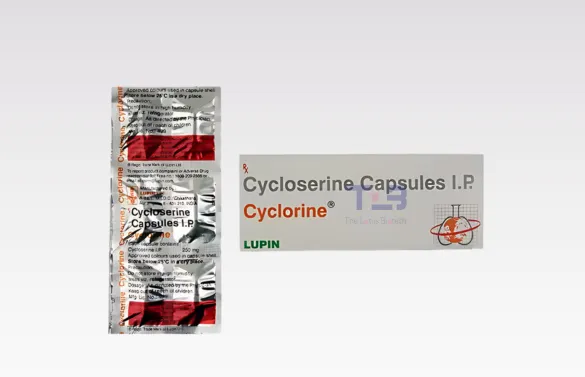Description
| Medicine | Cyclorine 250mg Capsule |
| Marketed By | Lupin Ltd. |
| Active Ingredient | Cycloserine 250mg |
| Storage | Store below 30°C |
| Consume Type | Oral |
Cyclorine Capsule- Introduction
Cyclorine in Cyclorine 250 is recommended for the treatment of active pulmonary and extrapulmonary tuberculosis, including renal illness when the major drugs such as streptomycin, isoniazid, rifampicin, and ethambutol have not been effective in treating the pathogens.
It might be useful in treating acute urinary tract infections brought on by sensitive Gram-positive and Gram-negative bacterial strains (particularly Escherichia coli and Klebsiella/Enterobacter species).
Note: Cycloserine, like all anti-tuberculous medications, should not be used as the only treatment agent; rather, it should be used in concert with other efficacious therapies.
How Cyclorine Capsule Works Works: A Closer Look
The mechanism of action of cycloserine 250mg involves interfering with an early step of bacterial cell wall synthesis leading to the infection-causing bacteria.
Use
Treatment of active pulmonary and extra-pulmonary tuberculosis.
Treatment of acute urinary tract infections
Cyclorine Capsule – The Benefits
Cyclorine 250 uses include:
- Active pulmonary and extra-pulmonary tuberculosis
- Acute urinary tract infections
Cyclorine Capsule- A Usage Guide
- Follow your doctor’s instructions on the dosage and duration of this medication.
- You can take a Cyclorine Capsule with or without food, however, taking it at a set time is preferable.
- Make sure to complete the course of therapy to avoid bacterial resistance.
Cyclorine Capsule- Side Effects
The majority of the cycloserine side effects fade away as your body adjusts to the medicine. If they persist longer than expected, booking an appointment with your doctor is advisable.
Common Side Effects
- Dizziness
- Drowsiness
- Changes in mood
- Headache
- Numbness
- Tingling
- Burning pain
[Note: Different drugs can cause varying side effects. To get accurate information about a medication’s side effects, refer to the official prescription information or consult your healthcare provider.]
Krrista Force Tablets- A Guide to Safety
Alcohol
Unsafe
Combining cycloserine with benzoyl alcohol may enhance the incidence or severity of methemoglobinemia. Hence, avoid drinking alcohol with Cyclorine 250.
Pregnancy
Unsafe
It falls under USFDA Pregnancy Category C, which indicates that while research on animals has shown negative effects on the fetus, no controlled trials on people or studies involving both women and animals are available. Take it under medical supervision as a result.
Breastfeeding
Unsafe
It can enter into breast milk. Hence, Unless absolutely required, it is not advised for use by nursing mothers. Before using this medication, you should talk with your doctor about all the advantages and disadvantages.
Driving
Unsafe
It can cause drowsiness hence it is advised not to engage in activities like operating heavy machines and driving vehicles.
Liver
Consult your Doctor
There is limited information about its use in liver conditions. Hence, consult your doctor.
Kidney
Consult your Doctor
There is limited information about its use in kidney conditions. Hence, consult your doctor.
Fact Box
| Chemical Group | Cyclic Derivative of Serine Hydroxamic Acid |
| Addictive | No |
| Medication Class | Broad-spectrum Antibiotic |
| Action Class/Category | Tuberculosis (TB) and Acute Urinary Tract Infections |
Swift Advice
- If you have an allergy to cycloserine 250mg, you shouldn’t take it.
- If you have severe renal illness, epilepsy, or other seizure disorders, you should not use it.
- It is not authorized for usage by those under the age of eighteen.
- In order to determine whether cycloserine is the best course of treatment for you, your doctor will run a blood test.
How long can you take cycloserine for?
The length of time you can take cycloserine varies based on the infection’s type and severity. For instance, for treating extrapulmonary tuberculosis in adults, the typical approach is as follows:
Initial dose: 250 mg taken orally every 12 hours – First two weeks.
Maintenance dose: 500 to 1000 mg taken orally per day, divided into smaller doses.
Max. dose: 1000 mg per day.
Can Cyclorine 250 be taken with other medications?
Cyclorine 250 can interact with the following medications:
- Tramadol
- Live cholera vaccine
- Bupropion
- Concurrent use of ethionamide can increase the neurotoxic side effects of cycloserine.
- Patients on cycloserine and isoniazid should be monitored for CNS toxicity signs, such as dizziness and drowsiness.
- Cycloserine and isoniazid have a combined toxic effect on the CNS.
Are there any dietary restrictions while taking Cyclorine 250?
Avoid using Cyclorine 250, which contains caffeine, without consulting your doctor to avoid possible side effects.
Can Cyclorine 250 be taken on an empty stomach?
Cyclorine 250 should be taken as prescribed by your doctor. It can usually be taken with or without food.
Who is the best supplier for Cyclorine 250?
The Lotus Biotech is the best supplier of pharmaceuticals, including Cyclorine 250. With our expertise in cold chain shipment, medical supply warehouses, supply chain hubs, and secure packaging, we ensure prompt delivery. For a customized estimate based on your needs and quantities, contact us now.











